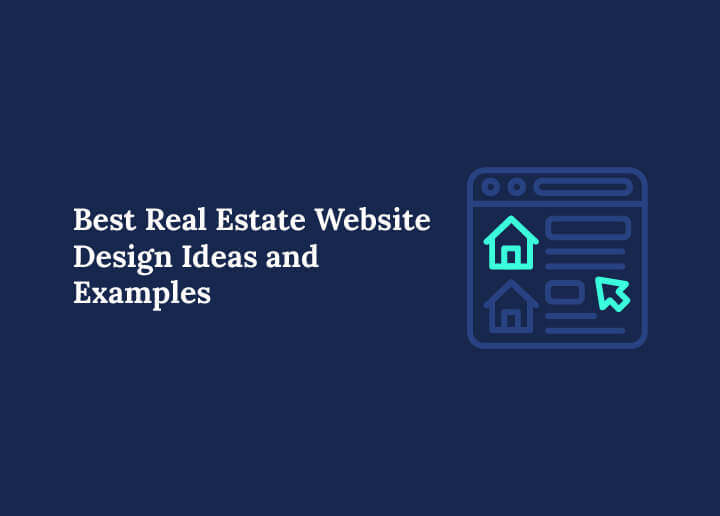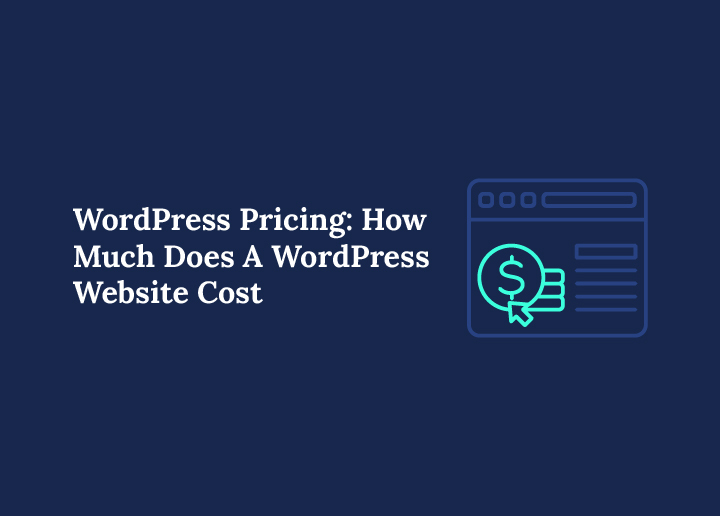Looking to stand out in today’s competitive real estate market? Your real estate website design could be the deal-maker or deal-breaker. With over 95% of homebuyers starting their search online, having a powerful website is no longer optional; it’s essential.
But here’s the catch: not all real estate websites convert visitors into leads. The difference lies in design.
From stunning visuals and seamless navigation to smart search tools and virtual tours, great design turns clicks into clients. In this guide, we’ll explore the best real estate site design ideas and real-world examples to help your agency succeed.
What Does Real Estate Website Design Mean?
Real estate website design refers to creating a professional, user-friendly online platform for showcasing property listings and real estate services.
It’s about balancing visuals with functionality to ensure the site attracts, engages, and converts potential buyers or sellers.
A great real estate website should:
- Be easy to navigate and mobile-friendly.
- Showcase listings with high-quality images and videos.
- Provide intuitive search and filter options.
- Highlight your expertise and brand personality.
When done right, website design can become your most powerful marketing tool. It’s like your digital storefront, open 24/7 to attract new clients.
Key Elements of Real Estate Website Design
The most successful real estate websites share common features. If you’re considering a redesign, these are the essentials to include:
- Mobile-First Design: With most property searches happening on mobile devices, your site must be fully responsive and fast.
- Advanced Property Search: Allow visitors to filter by price, location, square footage, and amenities. IDX/MLS integration is a must.
- High-Resolution Photos & Videos: Listings should include professional images, drone footage, and video walkthroughs.
- Virtual Tours & 3D Experiences: Buyers want to experience properties online before booking visits.
- Interactive Maps: Neighborhood insights, schools, amenities, and commute options should be integrated.
- Clean Navigation: A clutter-free design ensures visitors find what they need quickly.
- Clear CTAs (Calls-to-Action): Encourage visitors to book a consultation, schedule a viewing, or request more information.
- Lead Capture Tools: Contact forms, chatbots, and newsletter sign-ups help grow your database.
Explore: Website Design Guide for Professional Web Designers
How Seahawk Media Helps Real Estate Professionals?
A real estate website should do more than just showcase listings; it should also generate leads, build trust, and scale with your business goals.
At Seahawk Media, we specialize in creating real estate websites that combine cutting-edge design with measurable performance.
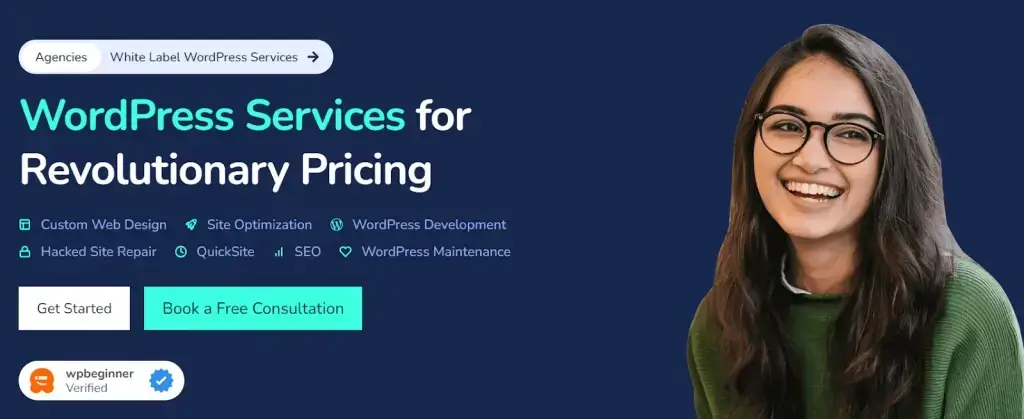
Our solutions are tailored to the unique needs of agents and agencies, helping you stay ahead in a competitive market.
- Custom WordPress Development: We build fully customized WordPress websites designed specifically for real estate professionals. Each design is tailored to reflect your brand and market positioning.
- IDX/MLS Integration: With seamless IDX/MLS integration, your website displays real-time property listings, ensuring your audience always sees the most updated information.
- SEO-Driven Strategies: Our team applies proven SEO techniques to boost your local visibility, helping you rank for keywords like “real estate agent near me” and attract qualified leads.
- Conversion-Focused Design: We design websites with lead generation in mind. From clear CTAs to optimized layouts, every element encourages visitors to take action.
- Ongoing Support & Security: Your website stays secure and high-performing with our continuous maintenance, security updates, and technical support.
At Seahawk Media, whether you’re an independent agent or a large brokerage, we deliver scalable, results-driven websites that help you sell more, faster.
Your Next Big Sale Could Start Here
Stand out with a website that shows your expertise, builds trust, and drives results.
Best Real Estate Website Design Examples
Learning from the best can help real estate agents and agencies understand what works in web design. These real-world examples show how smart design choices can make a website not only look stunning but also perform better.
Each example highlights a unique approach and offers a key takeaway that you can apply to your own real estate website strategy.
Zillow
Often called the “Google of real estate,” Zillow sets the gold standard in property search. Its intuitive interface, advanced filtering options, and interactive maps make it easy for users to find exactly what they’re looking for.
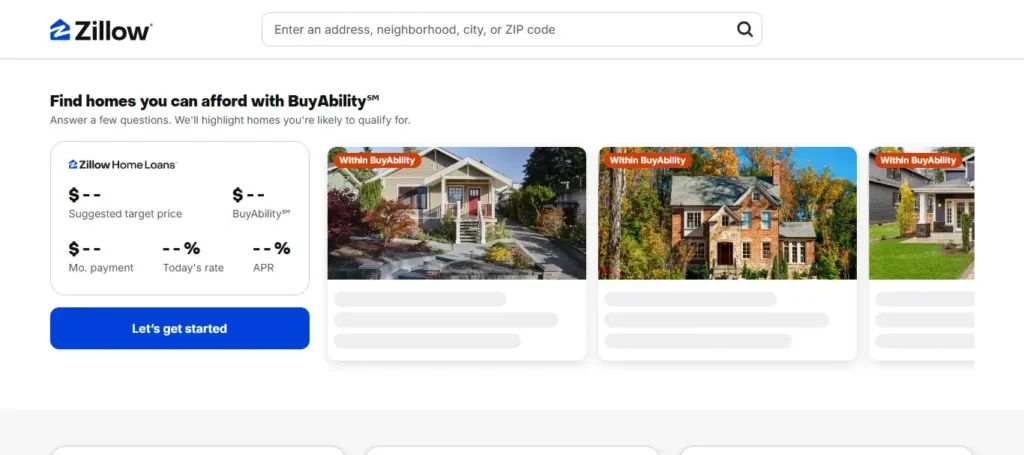
The platform also features rich data, including home value estimates and market insights.
The lesson here is clear: prioritize user experience and simplify property searches. When visitors can find homes effortlessly, they’re more likely to return and engage with your brand repeatedly.
Realtor.com
Realtor.com excels at blending usability with comprehensive listings. With seamless multiple listing service (MLS) integration, users gain access to up-to-date properties and detailed search filters.
Its simple navigation and clean design prevent users from feeling overwhelmed, even with large amounts of information.
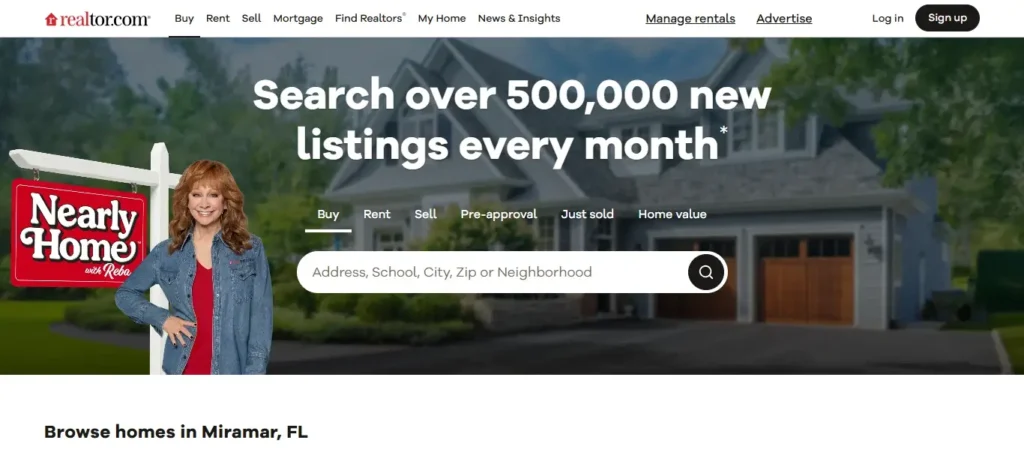
Realtor.com proves that accuracy and functionality go hand in hand. Agents can take inspiration from this model by ensuring their own sites feature real-time listings and intuitive design, which helps buyers feel confident and supported during their property search.
Compass
Compass has carved out a niche as a sleek, luxury-driven brand, and its website perfectly reflects that identity. With a minimalist design, bold typography, and stunning visuals, the site feels both premium and approachable.
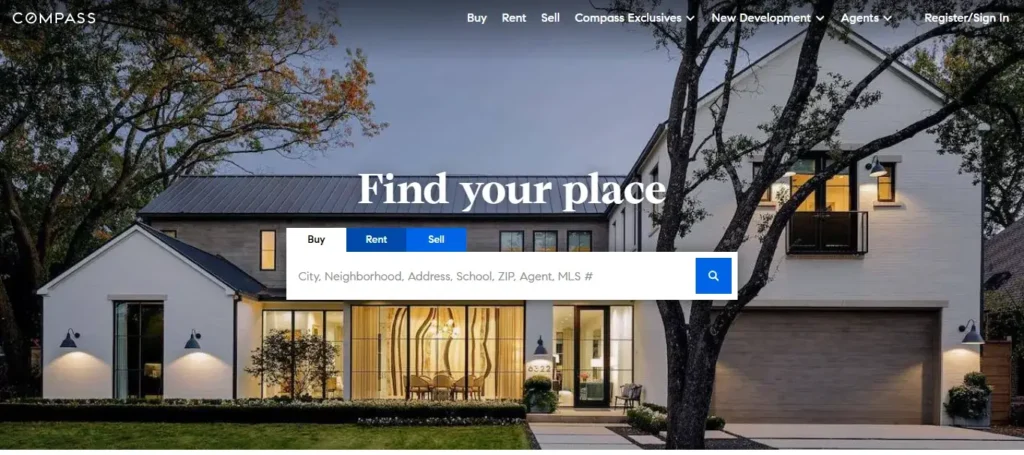
It strikes a balance between high-end branding and functional usability, ensuring visitors enjoy both the look and experience.
The key takeaway for real estate agents is to design websites that mirror their brand values. A strong, consistent brand identity makes an agency more memorable.
Sotheby’s International Realty
When it comes to luxury, Sotheby’s International Realty sets the standard. Their website uses breath-taking photography, elegant layouts, and high-resolution visuals to showcase premium listings.
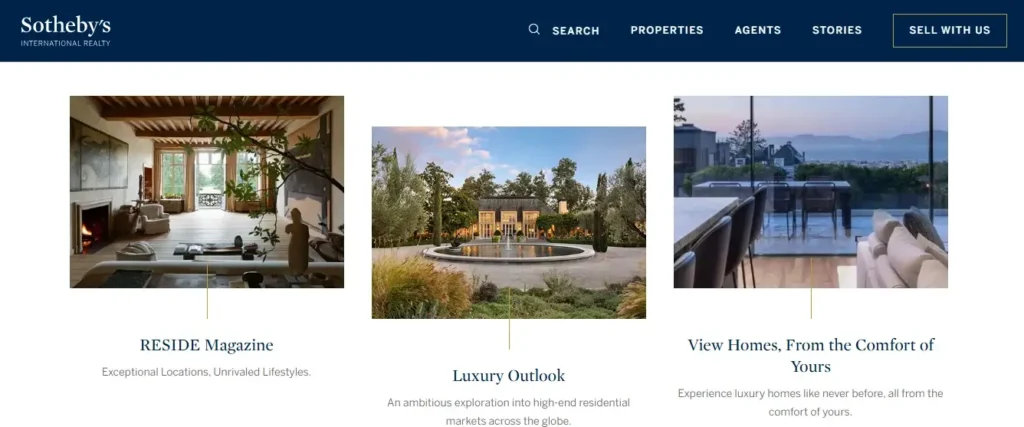
Each property feels like a piece of art, appealing directly to affluent buyers seeking exclusivity. The design emphasizes refinement and prestige, reinforcing the Sotheby’s brand.
The lesson for agents: invest in professional visuals and a polished design. A website that looks luxurious helps align your properties with buyers who value sophistication and quality.
Check out: Best Real Estate WordPress Themes
Trulia
Trulia goes beyond simple listings by creating a community-first experience. The site integrates neighborhood guides, school ratings, and crime data, giving buyers a full picture of what living in an area might be like. This adds tremendous value to users, helping them make informed decisions.
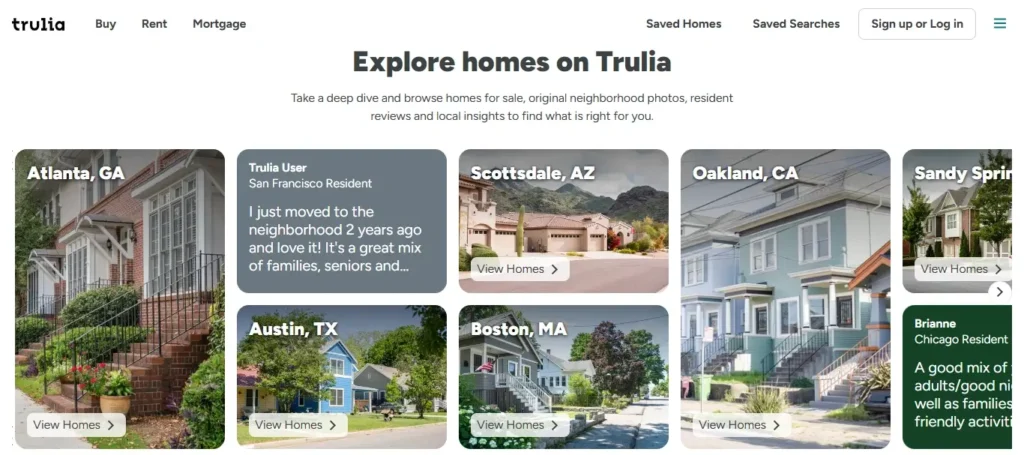
Trulia builds trust and authority by offering more than just homes for sale. Agents can replicate this approach by adding local content that highlights neighborhoods, making their website a go-to resource for buyers.
Redfin
Redfin is known for its real-time data and cutting-edge technology. The site provides instant updates, transparent pricing insights, and easy-to-use search features. Its modern design reinforces credibility and makes the user experience seamless.
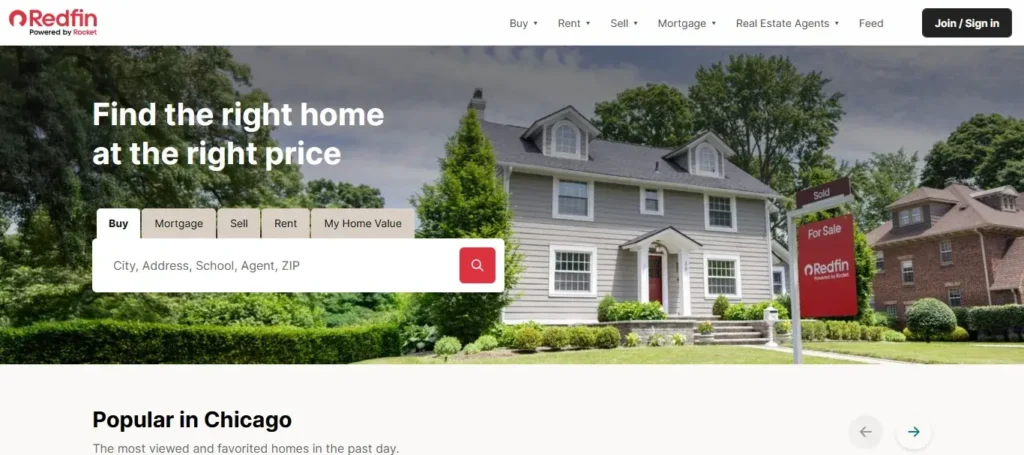
Buyers appreciate the accuracy and speed, which keeps them coming back. The big lesson here is that transparency builds trust.
Real estate professionals should consider incorporating tools like live updates or price trends to showcase their expertise and reliability, setting themselves apart from competitors.
Read about: Best Real Estate Directory Templates
Douglas Elliman
As a well-known luxury brokerage, Douglas Elliman’s website reflects professionalism at every level. Its sleek interface and polished design highlight both high-end listings and the agency’s prestige.
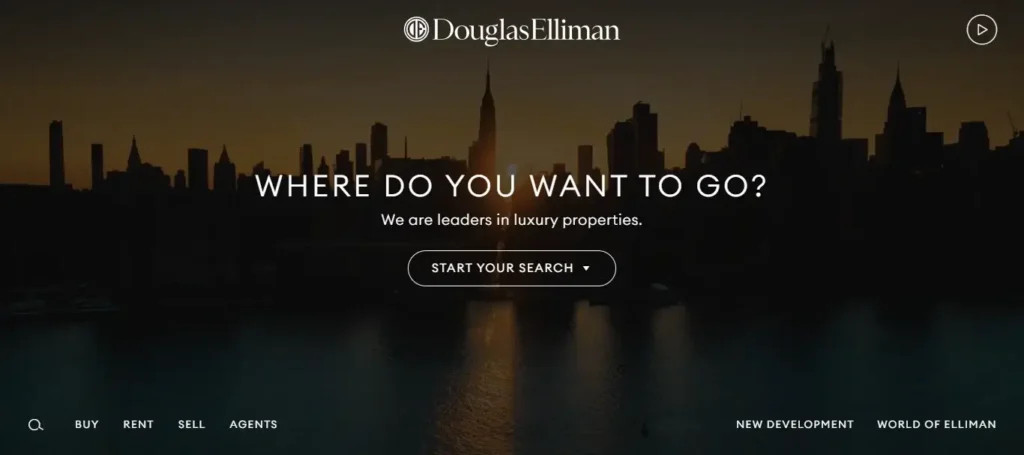
Advanced property search tools ensure functionality matches the aesthetics. The site proves that agents in the luxury market should embrace a refined design that resonates with affluent clients.
Key takeaway: professionalism in design speaks volumes. A clean, functional, and elegant website builds credibility while catering to a premium audience.
The Malibu Life (Madison Hildebrand)
The Malibu Life is a perfect example of how personal branding and real estate can go hand in hand. Built around celebrity realtor Madison Hildebrand, the site blends personality with property listings.
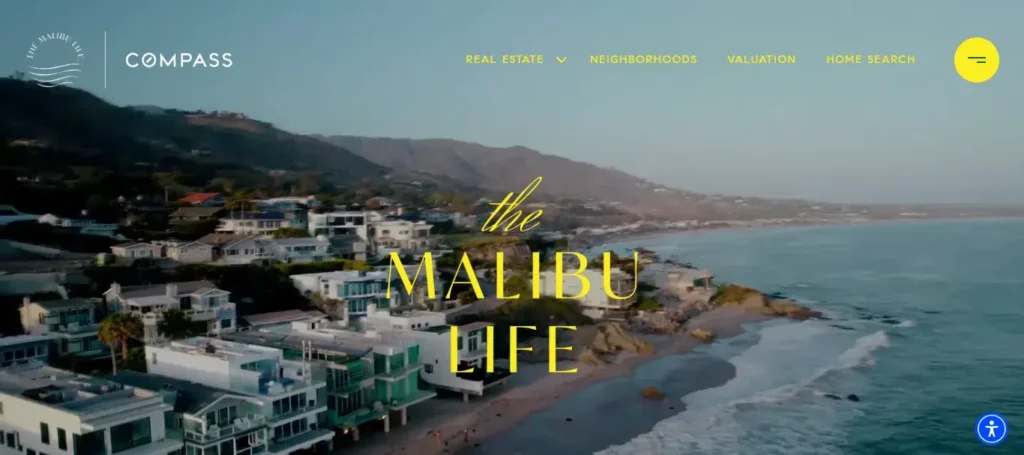
Storytelling plays a key role, making the site engaging and relatable. Visitors feel connected to both the agent and the homes he represents. The lesson here is that individual agents can use their personal brand to stand out, making their website more memorable and trustworthy.
Guide to: Create a Real Estate Website with WordPress
Corcoran Group
The Corcoran Group’s website stands out with its storytelling approach. Beyond showcasing homes, it emphasizes lifestyle through blog content, videos, and local guides. This helps buyers imagine what life might look like in different communities.
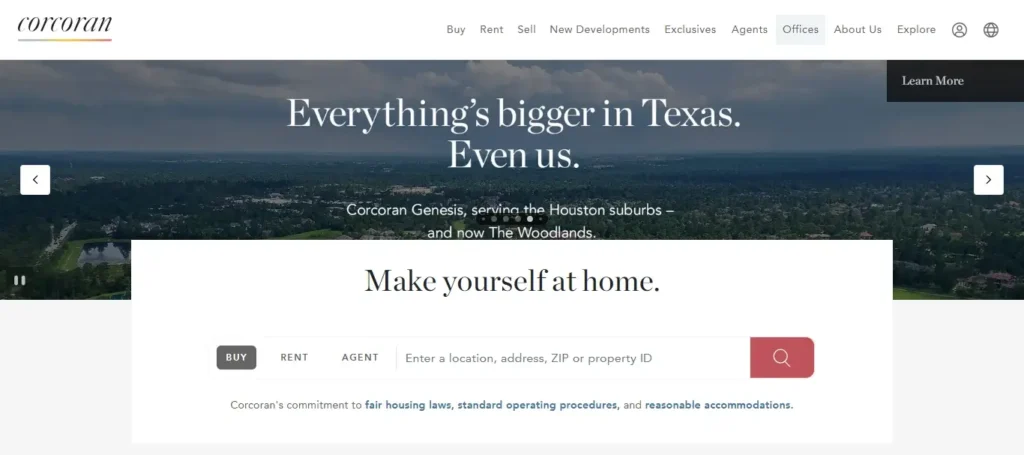
The clean design and professional visuals further enhance credibility. For real estate professionals, the lesson is simple: don’t just sell homes, sell the experience. A lifestyle-driven approach adds emotional appeal, making your brand resonate with clients on a deeper level.
Village Properties
Village Properties combines regional focus with modern design, making it a great example for boutique agencies. The site highlights beautiful imagery of properties while also showcasing community values and local expertise.
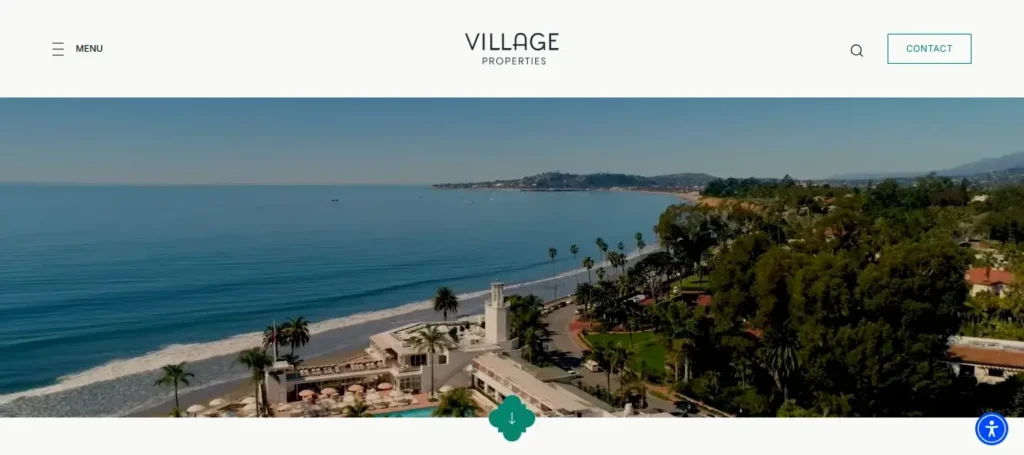
The design is approachable yet elegant, striking the right balance for regional buyers and sellers.
The key takeaway: tailor your design to your audience. By reflecting the unique characteristics of your market, you can create a website that feels both personal and trustworthy to local clients.
Also read: Best Construction WordPress Themes Free & Premium
Real Estate Website Design Trends
The real estate industry is constantly evolving, and so are the expectations of buyers and sellers. Modern consumers demand speed, convenience, and engaging digital experiences when searching for properties online.
As technology advances, real estate websites must adapt to stay competitive. Below are the most impactful design trends shaping the industry today.
- Virtual Reality (VR) Tours: Buyers can now “walk through” properties without leaving their homes. VR tours and 3D walkthroughs provide immersive experiences that save time and increase buyer confidence.
- AI-Driven Recommendations: Artificial intelligence analyzes user behavior to suggest personalized property listings. This trend improves engagement and helps visitors find homes that match their preferences faster.
- Minimalist Layouts: Clean, modern designs with simple navigation make websites more appealing and user-friendly. Minimalist layouts ensure the focus remains on the properties, not on distracting elements.
- Local SEO Optimization: With buyers frequently searching “homes for sale near me,” optimizing for local SEO has become essential. Websites with neighborhood-specific content rank higher and attract more targeted leads.
- Storytelling Through Video: Videos don’t just showcase homes; they highlight lifestyles. Agents use video storytelling to connect emotionally with potential buyers and build trust.
- Luxury Branding: High-end real estate demands exclusive, elegant design. Luxury-focused websites use premium visuals, refined typography, and sophisticated layouts to attract affluent buyers.
Embracing these trends helps real estate professionals deliver engaging, user-friendly experiences that convert visitors into loyal clients.
Discover: WordPress Development Trends
Website Design for Real Estates: Additional Things to Consider
To create a winning website, follow these best practices:
- Prioritize Speed: A slow-loading site can kill leads.
- Build Trust: Showcase testimonials, certifications, and press features.
- Use Strong CTAs: Guide users to book showings, download guides, or call you.
- Optimize for SEO: Use keywords like “real estate website design” and “best real estate websites.”
- Invest in Content: Blogs, neighborhood guides, and market updates position you as an expert.
Tools and Technologies for Real Estate Website Design
Building a professional site doesn’t mean starting from scratch. Essential tools include:
- CMS Platforms: WordPress (most popular for flexibility).
- IDX/MLS Integrations: Sync live property listings.
- SEO Plugins: AIOSEO, Yoast SEO, Rank Math for visibility.
- Analytics Tools: Google Analytics and Hotjar for insights.
- Security Add-ons: SSL, firewalls, malware protection.
At Seahawk Media, we leverage these tools while customizing them to each client’s needs.
Measuring Success in Real Estate Website Design
How do you know if your website is working? Track key metrics like:
- Traffic & Sessions: Are people finding your site?
- Bounce Rate: Do they stay or leave immediately?
- Lead Conversions: Are forms and CTAs generating inquiries?
- SEO Rankings: Are you showing up for local searches?
- Engagement: Are users interacting with maps, videos, or tours?
Using these insights, you can refine your design for better results.
Learn: Key Metrics to Track the Impact of Your WordPress Optimization
Real Estate Website Security
Security is non-negotiable in real estate website design. Clients share personal data, and you need to protect it. Best practices include:
- SSL Certificates (HTTPS).
- Regular backups and malware scans.
- Firewalls and spam filters.
- Secure lead forms to protect sensitive information.
Conclusion
Your website is the foundation of your digital presence as a real estate professional. A modern, user-friendly design can set you apart, attract more clients, and close more deals. From property search tools to high-quality visuals, every detail matters.
We’ve looked at the best real estate website design examples, the latest trends, and best practices. Now it’s your turn to put this knowledge into action.
At Seahawk Media, we build real estate websites that inspire trust, attract buyers, and drive conversions. If you’re ready to elevate your real estate business with a high-performing website, get in touch with our team today.
Real Estate Design FAQs
Why is website design important for real estate companies?
Website design plays a significant role in helping real estate companies attract potential clients, generate leads, and sell houses effectively.
What features should a great real estate website include?
A property search bar, high-resolution images, video content, and a clean layout create an engaging experience for website visitors.
How do search engines influence real estate websites?
Search engines rank many websites, but those with a strong marketing strategy, deep local roots, and clean lines perform better.
What makes the Malibu Life website a good example?
The Malibu Life website highlights exclusive properties and luxury homes while maintaining a user-friendly interface and luxury presence.
How do high-end properties get showcased online?
High-end properties, whether in Beverly Hills, Santa Barbara, or San Diego, require professional visuals, a refined color palette, and a clean layout.
How do mobile users impact real estate web design?
Since mobile users dominate online traffic, companies must ensure responsive design, quick loading, and an engaging experience across devices.
What role does content play on real estate websites?
From lifestyle blogs to Wall Street Journal features, adding links, video content, and stories about houses strengthens authority and appeals to the target audience.
